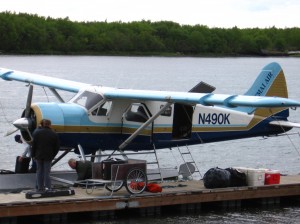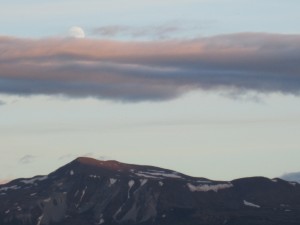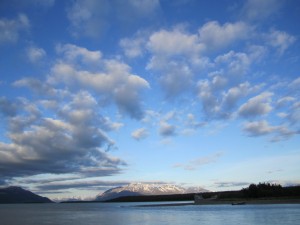Katmai Air
categories: Cocktail Hour
3 comments
Before I left home I emailed some of the Alaska writers involved in the Kachemak Bay Writers Conference and asked for suggestions: what should I do with a free week after? I’d had the vague idea to rent a car and poke around, maybe drive into Denali National Park among the Winnebagos and do some hiking. Rich Chiappone emailed straight back, said Denali was nice—if you wanted to stay on the road system. He’d even try to hook me up with a sleeping bag and tent, then this: “To decompress after the conference, I’m heading out to Katmai for a week of camping with the brown bears from June 18 to 24. You could join me and my wife and a couple of fly-fishing degenerates out there if you felt adventurous. That is the famous Brooks river where most of the photos of bears chomping sockeye salmon at the waterfall come from (Google Katmai National Park– Brooks Camp). You gotta really like bears. And, of course, you have to fly to get there, so it’s expensive.”
I did Google the bears. Also flights: the price of the flight to King Salmon plus the float plane flight to Katmai wasn’t a lot more than renting a car for a week, but there’d be no stray hotel rooms, and there’d be no stray restaurant meals, so, in fact, the whole thing would be cheaper. But then there was the issue of my injured neck. For those of you who missed chapter three of my video extravaganza “I Used to Play in Bands,” I have a disk fragment lodged in my spinal column, fuck, nice MRI portraits of three herniated disks around it (chapter ten is Katmai…). I’m waiting for the fragment to be resorbed (medical speak, sorry…) by my recalcitrant body, still trying to avoid surgery. Since November! Resorbtion (or whatever the noun might be) can take up to 18 months, only 12 to go. I can sleep fine, I can walk fine, but sitting? Sitting is unbearable. (So you’d better appreciate me sitting here at my computer writing this for you!)(Okay, fine, I’m writing it for myself—lately sometimes standing at an antique podium I bought some years ago at a university sale, like Ernest Hemingway, who stood up when he was writing dialogue, but that was with a fountain pen…). I’d been nervous for months about going to Alaska at all—all that flying time—fourteen hours cramped in a succession of airplane seats (Hemingway escaped a flaming plane wreck in Africa by butting the door open with his head—may have led to his fatal dementia).
I emailed back to Rich, outlining all that, not mentioning Hemingway or that the idea of camping with bears and dropping in by floatplane scared the piss out of me. In fact in the night I’d decided there was no way I could go on any fancy trips with my neck situation—maybe better just to check into an old-age home in Anchorage and look at images of back-country Alaska through a stereopticon, safe from bears and float planes (also from Hemingway, whom I loved in college but can’t really read with much pleasure anymore after teaching it to a diverse class at Ohio State, who were individually and collectively very much offended by his casual trashing of Blacks and Jews and women and people who have to work and so forth in “The Sun Also Rises,” though they kind of admired his barely disguised pan-sexualism). (And a Basque-heritage kid in the group loved the book.)(But I digress.)
I’m big on anticipatory anxiety. Also I’ve seen the movie “Grizzly Man.” Which the Grizzly Man himself filmed most of, until he was eaten. (Werner Herzog, film genius, formed the footage into a kind of posthumous self-requiem.) Maybe my neck brace would protect me–would definitely take extra seconds to chew through. Then again, my neck was already sore enough, and my hand half numb.
Professor Chiappone, total stranger, reassured me I’d live:
“Oh man, a neck problem? Don’t even talk to me about that. I just scheduled further MRI’s so that the super high-powered spine experts can plan how to slice and dice my mangled cervical vertebrae. So, I really know how you feel about camping; I get by with Thermo Rest heating pads and lots of Oxycodone–not to mention vodka. But I understand. I hope you are doing better than I am right now. A little pain is good for a writer, but this is ridiculous.”
#
The King Salmon flight is packed with mostly men, men going to fish—the salmon are coming in, they always come in, at least for now, until whatever the next ecological disaster. It’s a cheerful, hopeful crowd, a fishing-for-dollars crowd. Supplemented thinly by the people who’ll support them—cannery workers, galley people, bartenders, lackeys. And more thickly by sports—people coming to fish whose families and very lives don’t depend on it, people with money, people with time, people with gear, people aiming to spend money, not earn it.
Like me.
And of course Rich and Lin back in the plane somewhere, who are working people, Rich a paperhanger turned writer and then professor, Lin a guidance counselor at Homer High. The kid next to me is 14 and arriving from Seattle—he’ll fish his uncle’s boat. He’s really funny and teases me and wants to try on my neck brace, then won’t give it back, very comical, all my former fears like mist, forgotten. Kid needs a guidance counselor. His uncle is a slave-driver, he says. “I’ll get like two hours sleep a night in a hammock belowdecks, maybe if I’m lucky, otherwise you just fish till the salmon are out. What’s your boat?”
I don’t answer.
“What’s your boat?” he says again.
“I need that neck brace,” I say.
“Your boat?”
“I’ll be in a pup tent.”
He loves that, thinks I’m being funny, doesn’t detect any difference between the two of us. He must have a very distant dad, or maybe no dad; anyway, he’s very intent on entertaining me.
All my travel anxiety is gone. Nothing. This I keep noticing. I’m calm and happy.
(Once fifteen years ago I got hypnotized—a barter exchange for helping the therapist write his brochure. “What do you want to work on?” he said first session of four. I was been about to go on a major trip and said something about travel anxiety, forgot to mention the anticipatory part, or didn’t know about it yet, I mean, hadn’t defined it. Anyway, four sessions with this American Sufi, sessions that felt pretty good, great dreamy sleep for days after, but useless therapeutically I thought, at least till the big trip started, my getting into a car then a plane, and my subsequently and suddenly realizing that I had never, not ever, never-never-never been calmer, not in any situation. And it still works—no idea what suggestion he implanted—but I’m anxious till I’m on the road, and then, the second the seatbelt’s clicked, I’m fine, fine, fine, eerily calm through all delays, all ticket mishaps, all overweight suitcases, all disasters.)
I spent an hour last night at my crappy Anchorage hotel (booked by Internet on the basis of cheap) lightening my suitcase—deodorant, gone. For example. Three-quarters of a tube of heavy toothpaste squeezed into the toilet, for another. Dirty socks, heavy shirt I don’t like anyway, pants I like but can replace, notebook I’m not going to use, book someone gave me at the conference, rock I picked up on the beach, lots of little stuff, too, tube of this, bottle of that, wrappers, snow-globe packaging: I dropped ten pounds.
Flight attendant as we approach the gate: “Happy fishing!”
Kid beside me: “Camping will fix that neck of yours!” He pretends he’s not going to give me back the brace. He pretends his neck is broken, lolls pathetically. Then he’s punching my arm, he’s pretending he’s going to throttle me, he’s leaning at me affectionately: “Unless you die!”
In the airport mounted fish on the walls—huge salmon, enormous trout. And men everywhere, milling, pressing up to the baggage claim, testosterone you can all but hear crackling, and can definitely smell. A huge Bluto guy shoves me out ot the way, pushes my seat-mate in the chest, and they half-hug, not a smile between them, the uncle Captain. I’m invisible.
The Katmai Air shuttle driver spots Rich before I do, and they’re laughing together immediately, and back over there Lin is saying hi to one of the only women in the throng.
“One of my students,” she says gaily, joining us.
Small, smelly world, as my mother used to say.
#
“Weigh up and we’ll be right with you,” the clerk at the Katmai Air dock says. My bag is a sprightly 45 pounds now, tent inside, and I’m a dainty 200, which was Mr. Hemingway’s adult weight. Turns out you pay by the pound, and I’m the most expensive sport on the plane. The pilot sizes me up: “Co-pilot,” he says. The heaviest passenger sits up front. Like ballast, I guess. Our pilot’s lean and tanned and gray and looks perfectly experienced—you know he started his flying in Vietnam. You know he’s not going to be making any dumb mistakes.
Skid along the water and into the air and the engine’s loud and everything’s vibrating, glorious. Little kettle ponds below. Rich shouts a query about nesting swans and the pilot shouts that they’ve mostly already left, suddenly veers to port and drops and points—white splotches on the water below, like trash bags from the air, maybe 50 of them. “Thousands last week,” the pilot shouts.
Ahead the shallow kettles and bogs open up into a lake, then another, and then mountains appear out of the mist, and a vast ridge of snow that only gets vaster, higher: volcano. We’re coming into the park. The pilot points out a moose grazing below, but I can’t see it. “No time to circle back,” he shouts.
“I’m from Maine,” I say.
“Oh, well, fuck,” the he shouts, semblance of a smile coming to his tight mouth. “Like you need a moose.”
Rain spatters on the windshield, the plane rattles and roars, the mountains come closer. We’re flying between ridges now and shortly we’re turning, the pilot pulling at knobs and spinning at arcane dials with his fingers and tapping a gauge that seems not to be registering anything. And down, down to the surface of the lake, not my first water landing, but my first in Alaska, which must count for something, enormous body of water ahead of us, enormous landscape beyond, enormous sky above, not a building of any kind in sight, nothing but the land and the whitecap water and the sky.
“What’s the biggest chop this plane can handle?” I say, merely curious, humming happily with permanent post-hypnotic suggestion.
“Haven’t yet found out,” the pilot says.
The joke takes a minute to sink in.
The landing is like nothing. We putter then across the lake to a long gravel beach, where a knot of young men are ready to greet us. It’s eight p.m., but might as well be three in the afternoon, the sun’s that high. I picture suddenly my frantic search for a flashlight as I was leaving home in Maine—someone should have told me: no use for a flashlight here, not on June 19. The young men help us down off the floats and onto the beach, jolly guys all heading back to grad school in the fall (budding biologists, many of them), then they dig our bags out of the spare passenger seats and out of the compartments built into pontoons, and out from under the tail. They’ll take our stuff to the campsites for us in carts.
“What happened to your fucking neck?” one of them says.
“Nothing,” Rich says for me.
We have to attend a mandatory bear talk at the ranger station. We watch a video, people walking through the forest saying “Hello bear,” and Kristina the ranger shows us actual backpacks and sleeping bags and tents destroyed by bears, points out the gouges and claw marks up and down the front of the very building we’re sitting in, on every building in the Brooks Lodge compound. She’s around bears all day, doesn’t seem concerned. Brown bears and grizzly bears, she says, are one and the same species, the words don’t change the beast. And the bears are heading down from the hills to this very spot, she says, soon to be here in scores, because the salmon are coming, the salmon are coming, and soon the Brooks River will be full of salmon, and then bears, people too.
“We’ll take the trout,” Rich says.
Cheerfully, Ranger Kristina hands out 2010 bear badges to pin to our hats, fills out our tent passes left-handed (I notice things like that, a curse), and we’re good to go.
Rich thinks we ought to check the bar at the lodge and, solid intuition, we find Jack and Bob and Jim, his old pals, our camping mates. Plenty of booze at camp, they say, and soon we’re all marching the half-mile or so to the campground, which in late years has been surrounded by a solar-powered electric fence. “Bears used to just come straight through camp all night,” Rich tells me. “They used to roll in the fire pits. The fence is nice. It means you can sleep.”
We get our tents set up with the help of Rich’s old friends just before a nice rain comes in, a gentle mountain rain in the long, long shadows of the long, long evening. 60 degrees north latitude, nice. Drinks in the bug shelter these great people have shipped in, Rich’s friends, soon to me my friends, too, no luxury spared, these long-time adventurers who’ve earned their comforts and know how to achieve them.
Not I, I haven’t earned anything, don’t know anything, but I eat the mixed nuts someone pushes at me till Deb takes the jar away. She’s Bill’s wife, I think. The other Bill. He’s a retired lawyer, Rich has said. Also a writer and photographer. She’s a nurse. They are real lovebirds. To me she says, “The rest of the nuts are for another night.” She’s pretty serious.
I’m chagrined. Another new culture to navigate.
And so the others break out the jokes: Deb has made an actual spreadsheet apportioning all the grub, all the goodies, all the alcohol, they say, and repeat, and then repeat again, pretty funny. True or not, I can’t tell. Spreadsheet! Already I like these people. Deb takes the ribbing good-naturedly, and by god it’s pretty sweet drinking Jameson’s from a borrowed camp cup and looking out over Naknek lake in the heart of bear country far from any contact with the world, the float planes gone quiet, the wind died down, the rain ceased, the birds silent. And then a crunching sound, and oh, sweeter yet when a pair of scrawny bears come ambling along on the beach. They look our direction, stand and sniff, linger a while, but they’ve learned what electric means, and they have no truck with people, and before long they amble away.
“Mother and yearling,” Deb says. She and her husband and the others have all been here several days already, have been coming here thirty years. This pair of bears they’ve met. This pair of bears they’ve heard all about from the rangers and biologists. “Very hungry,” she says. “Fresh from hibernation.”
I haven’t seen the inside of my little backpacking tent for years and I’m so happy inside it reading in the midnight twilight, reading myself to sleep, no need of a flashlight after all.





Hi Bill, I was one of those working grad students years ago – but one of yours! I’ll understand if you don’t remember me, but I spent two summers working at Brooks before moving to Alaska after the MFA. A completely magical place – glad you got to see it and great to read your writing again.
Beautiful, Bill. Like the great letters writers and writerly friends used to send to each other. Maybe some still do. But I am grateful to share this as a blog reader. And what evocative photos.
Watch that hand. A little numbness, no big deal. Muscles weakening and then shrinking, big deal. Acupuncture won’t fix your neck but helps a lot with pain. Nothing against booze, of course. Get surgery if you need it; they have gotten really good.
I’m just an adjunct instructor, Bill.